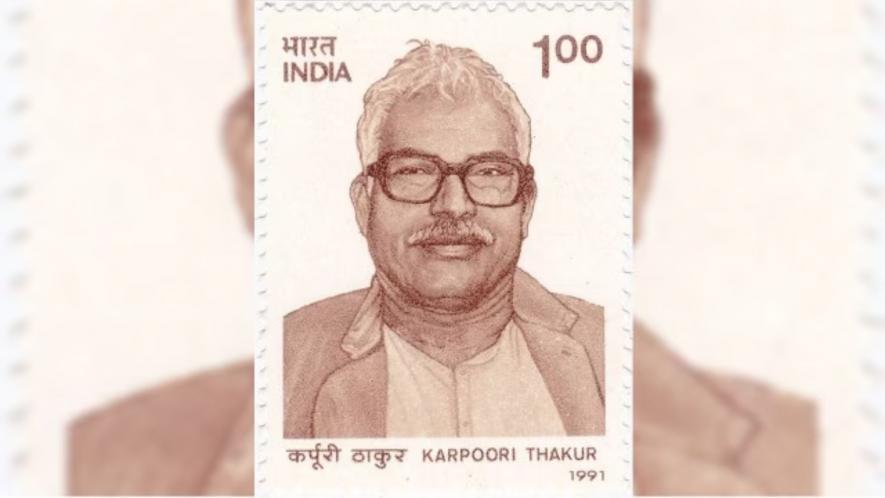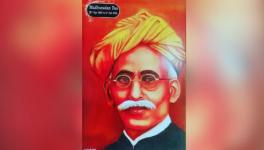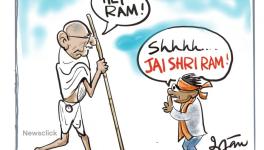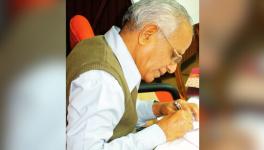Current Indian Politics and Karpoori Thakur

Image Courtesy: Wikipedia
In the fight for India’s independence, there was a collective dream about what the future India would be like. This vision was implemented under a common programme.
Today, when the 'Idea of India', which gives us a socialist, secular, democratic and equality of social, economic and political justice, freedom of thought, expression, belief etc., dignity and opportunity to all citizens, is in danger, the mind recalls the role of ‘Jan Nayak’ (people’s Hero) Karpoori Thakur.
This is the birth centenary year of Karpoori Thakur, who was born on January 24 January, 1924 in Samastipur, Bihar. From attaining school education in very poor economic conditions to rising to the top leadership of Bihar was an arduous journey for him.
On Wednesday, the Union government announced the country’s highest award, the Bharat Ratna, for him. Even if it is late, this is a good decision. But in the true sense, this decision will matter only when the democratic-socialist policies of Karpoori Thakur are followed and implemented. But the present Central government seems to be moving on the opposite path.
In the present political scenario, the curriculum is being changed from right from primary education to higher education, and attempts are being made to inculcate religious sentiments by replacing scientific temper. However, this does not mean that there should not be religious education.
But this cannot be done at the cost of logic and science. Babasaheb Bhimrao Ambedkar used to say that every human being needs a spiritual feeling along with material happiness.
Recall that on August 21, 1984, Karpoori Thakur had said in the Bihar Assembly that Bihar will not progress by visiting Baba Dham (the Baidyanath Dham of Deoghar). “I am not saying that worship should not be done and people should not move toward spirituality, but if someone goes to Baba Dham for his son or daughter, or for four cows, then that will yield nothing,” he had said (loose translation).
It is clear from Karpoori Thakur’s above statement that he was not against religion, but firmly believed that if one wants to get rid of the everyday problems, then one will have to find a physical solution for it. Spirituality alone cannot offer solutions. Today, when efforts are being made to sidetrack all basic problems being faced by the common man and painting a religious colour over them, Karpoori Thakur’s politics that focused on people on the margins and outlined solutions to the common person’s daily problems sound no less than an ideal.
Whether Karpuri ji was in the government or in the opposition, he always lived a simple life and made the common problems of the common people his problems. What could have been/is the role of the government in creating that problem or in solving it, has been openly talked about from the streets to the House.
Whether Karpoori Thakur was in government or in Opposition, he lived a simple life and made the common problems of the common people his own. On the streets and in the House, he was fully involved in working out ways to help the problems of the masses. For example, his questions on the irrigation system and the role of the government in dealing with the famine situation. On July 5, 1982, while in Opposition, he had raised the question on why the government was not spending more on irrigation. He said "If less irrigation capacity is created, “how can we fight famine? …There should be arrangements for irrigation in the state, but loot is going on there…”
In present day politics, money power plays a big role, especially in elections. It remains a big challenge for current Indian politics, especially elections. However, no government or leaders seem to have any intention of solving this problem, except Left politics.
Karpoori Thakur was firmly against this game of money power. He often spoke against the three 'C's' in politics-- cash, caste and crime. He was also a vocal opponent of the capitalist character of governments.
On December 18, 1980, he had said in a resolution in the Bihar Assembly that the capitalist economy of the country should be fundamentally changed, and to bring about change in this economy, a government which was born in capitalism, which wants to make rich people rich, should be removed.
Further, considering the capitalist economy responsible for inflation, he also said that it was necessary to find some solution to stem the gradual increase in prices of all essential commodities to do away with the shortage of these commodities. One of the solutions of this, he said, was also to remove the capitalist government and establish one with new economic policies.
In current Indian politics, there is another model – the Bihar Model – the foundation of which was laid by socialists like Karpoori Thakur. The incumbent Bihar government’s claim is that lakhs of people were given government jobs in less than a year. And new employment opportunities are being provided.
Besides, an initiative has been started to provide social and economic justice to every section of society in Bihar by conducting a caste-based survey. On the basis of this survey, about 94 lakh people in Bihar have been marked below the poverty line, whose family monthly income is less than Rs. 6,000. The government has started an initiative to provide Rs 2 lakh each to such families for any kind of employment. In the 1980s and 1990s, socialists like Karpoori Thakur used to give the slogan, 'Pichda Paave Sau Saath' (60% reservation for backward castes). In fact, the Bihar model embodied this slogan when it increased the scope of reservation based on the caste-based survey to 75%.
In Bihar, Karpoori Thakur was the first leader who, on the suggestion of the Mungerilal Commission, made the provision of reservation for socially, economically and gender backward communities in education and government jobs. His reservation formula was very popular. He had bifurcated backward class reservation. He made a provision of 26% reservation during his tenure as Chief Minister in which 12% was for extremely backward, 8% for backward and 3.3% was for economically backward and women.
Today, when social justice is being destroyed through social engineering, constitutional values, like socialism are being openly flouted, then a strong and powerful fight by Karpoori Thakur against the Emergency, could go a long way in proving helpful to fight the problems of the present times.
When Jayaprakash Narayan took over the leadership of the students' movement in 1974, he demanded the resignation of Assembly members from Opposition parties (non-Congress). Karpoori Thakur was the first Assembly member to stand in support of this demand. He resigned from the Bihar Assembly.
He remained very active in this (JP) movement till the imposition of Emergency in 1975. During that time, when non-Congress leaders were being arrested and sent to jail, Karpoori Thakur went underground to strengthen the movement. He took refuge in Nepal but did not sit quietly. She strengthened the anti-Emergency movement by meeting different Opposition leaders in disguise in various cities of India. The outcome was that non-Congress opposition parties – Jan Sangh, Bharatiya Lok Dal, Socialist and Sangathan Congress – decided to form a political party, which we know as Janata Party.
Today, when a situation like an ‘undeclared emergency’ is being felt in India, it is due to the inspiration of Karpoori Thakur that Bihar Chief Minister Nitish Kumar and Rashtriya Janata Dal supremo Lalu Prasad Yadav, who even with health issues, have taken the initiative to form a non-BJP national alliance, the result of which is the INDIA coalition. Therefore, in the current politics of India, Karpoori Thakur’s ideas are capable of providing a political alternative along with solutions to problems being faced by the masses.
(English translation of the original article published on our Hindi website)
The writer is an independent journalist. The views are personal.
Get the latest reports & analysis with people's perspective on Protests, movements & deep analytical videos, discussions of the current affairs in your Telegram app. Subscribe to NewsClick's Telegram channel & get Real-Time updates on stories, as they get published on our website.























